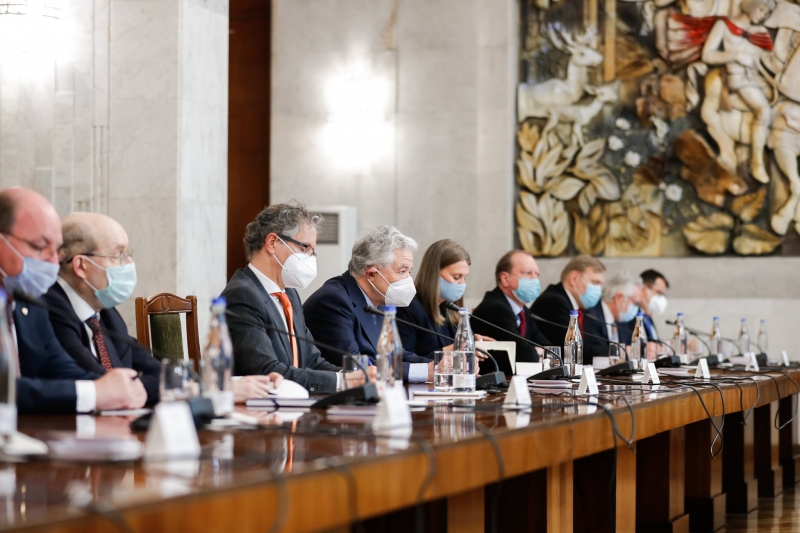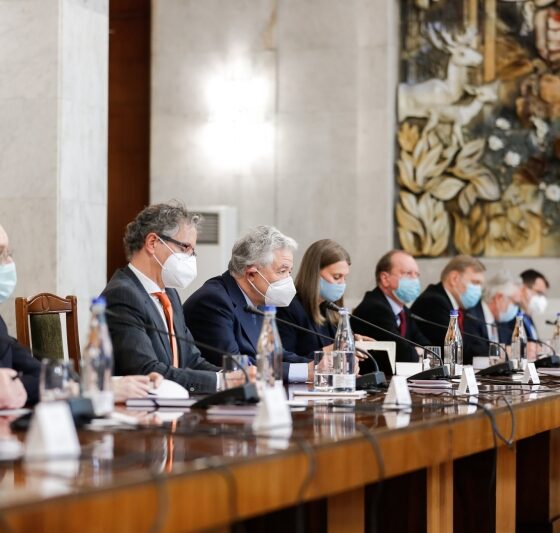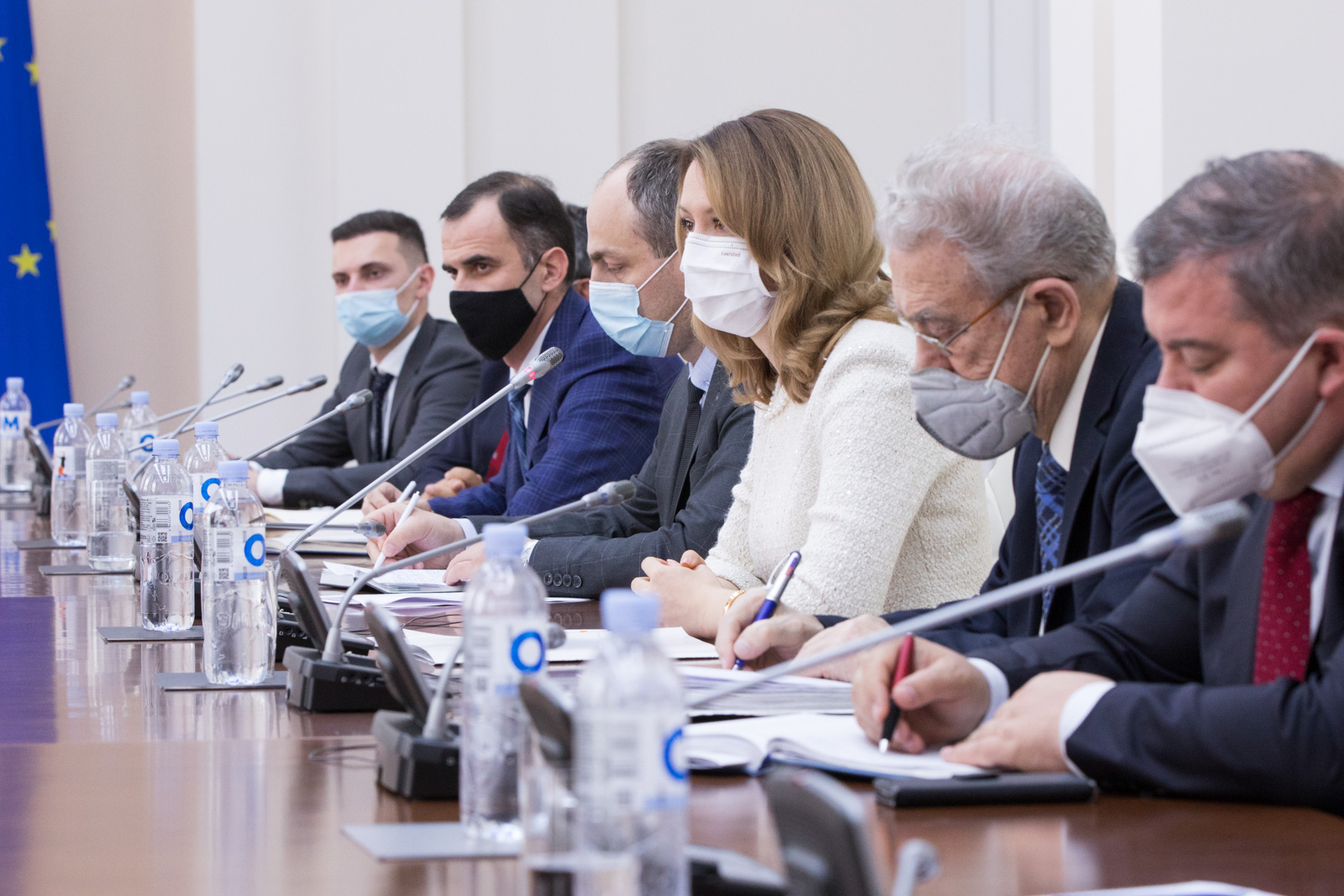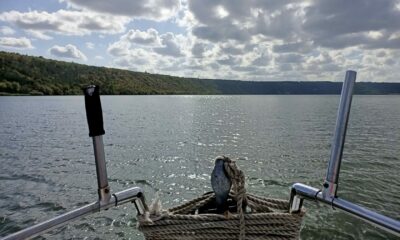

Reintegration
The role of the 5+2 negotiations and the Russian ‘peacekeeping mission’ in settling the Transnistrian conflict
These days, a delegation of mediators and observers at the Permanent Conference on Political Issues in the negotiation process for the Transnistrian settlement in the 5+2 format are paying an official visit to the Republic of Moldova. The delegation is led by Thomas Mayr-Harting, Special Representative of the OSCE Chairman-in-Office for the Transnistrian settlement process.
The delegation have already met with several Moldovan officials, including President Maia Sandu, Acting Prime Minister, Aureliu Ciocoi, and Acting Deputy Prime Minister for Reintegration, Olga Cebotari. In Tiraspol, they are about to meet with the Transnistrian leader, Vadim Krasnoselski, and the regime’s political representative, Vitali Ignatiev.
When discussing with both Moldovan and Transnistrian sides, mediators and observers exchange views on the current state of affairs and review the potential forthcoming actions for improving lives of people on both banks of the Dniester, especially when it comes to freedom of movement, protection of human rights, transportation and healthcare.
In the common meeting with the Acting Government representatives, the implementation of agreements in the Berlin+ conventional package was discussed: ensuring proper functioning of Moldovan educational institutions, access to agricultural plots in the conflict region, purchase of new ferries to transport passengers and goods across the Dniester, reconstructions works of the main land access routes, etc.

Source: gov.md
The delegation officials noted the need to unblock the activity of the Joint Control Commission (JCC) and to remove the infrastructure of unilateral checkpoints, which violate the regime of the Security Zone and the rights of Moldovan citizens.
See also: Fighting for human rights in Transnistria – using all legal means or not using them at all
Moreover, the need to ensure the non-discriminatory exercise of the electoral right of all citizens throughout the country and abroad, during the snap elections held on July 11, was emphasised.
President Maia Sandu discussed with the representatives of the 5 + 2 format about the principles of resolving the Transnistrian conflict, which might take place peacefully, through dialogue, respecting the sovereignty and territorial integrity of the Republic of Moldova. “I reiterated the need to formulate a vision for a political solution to the conflict. This action must be on the agenda of the next Government, appointed after the snap parliamentary elections in July “, mentioned the president.

Source: presedinte.md
The OSCE (Organisation for Security and Co-operation in Europe) facilitates a three-tier negotiation process for a comprehensive and lasting political settlement of the Transdniestrian conflict. The negotiation process includes Moldova and Transnistria as the sides, the OSCE, Russia and Ukraine as the mediators, and the European Union and the United States as the observers (the 5+2 format).
The Mission uses shuttle diplomacy to stimulate the dialogue between Chisinau and Tiraspol and advance the Transnistrian settlement process. It convenes meetings in the 5+2 format to mark the progress reached by the sides and establish new objectives. The work on certain confidence-building measures is agreed to be done, in order to improve the day-to-day life of students, teachers, farmers, entrepreneurs on both banks of the Dniester. Still, the mission can’t decide on the special status of the Transnistrian Region within the Republic of Moldova. That is done by the sides.
Since 1994, the Mission has participated as an observer in the Joint Control Commission (JCC). It gathers and provides information on the situation in the Security Zone, sharing its findings with all the delegations to the JCC and the 57 OSCE participating states.
**
At the same time, a so-called peacekeeping mission is also being carried out in the Transnistrian region. It is composed of several contingents: the armed forces of the Russian Federation, the armed forces of the Republic of Moldova, the Tiraspol administration forces and Ukrainian observers. Moscow keeps around 500 soldiers as part of the mission and 1 500 soldiers within the Operational Group of Russian Forces in Transnistria (OGRF) that still conduct over 100 military exercises each year. About 1000 of Russian soldiers supervise the Cobasna arms depot, which is thought to house about 20 000 tons of guns and ammunition.
Both the Russian Federation and the administration of the Transnistrian region insist on the effectiveness of the mission. The Ministry of Defence of the Russian Federation stated that the Russian forces “were successful in their mission” of establishing a safety area and proceeding to peacekeeping activities, such as clearing the minefields in the areas of combat or interdicting the trafficking of arms, ammunition, explosives and drugs. What they did as well, was establishing multiple stations and checkpoints, being always militarily present in the area.
According to Ministry of Defence of the Russian Federation, the Russian peacekeeping contingent in Transnistria has the following mission:
- maintain personnel alive and healthy;
- keep weapons and ammunition secure;
- prevent breaches of military discipline involving unfriendly acts on the local population.
Nonetheless, according to the Promo-LEX Association, the peacekeeping mission on the Dniester “is composed of belligerent forces, imposed by the Russian Federation, which was part of the conflict since 1992.”
“Contrary to constitutional authorities, the Russian Federation maintains a military contingent on the territory of the Republic of Moldova and constantly conducts military exercises, endangering the lives and security of people.”
The association reported that the peacekeeping forces deployed on the territory of the Republic of Moldova do not have a mandate recognized by the United Nations – an organization that bears the primary responsibility for world peace and security – and no term for carrying out the mission, in accordance with international principles and standards. “From the point of view of respect for human rights, the current format of the peacekeeping mission is inappropriate and outdated. Over the past three decades, representatives of the Dniester peacekeeping mission have been involved in several incidents related to the intimidation of human rights defenders and journalists, illegal detentions, people killing, etc.”
Few people in the Transnistrian region know and understand what are the peacekeeping mission responsibilities and goals, whereas Russian military forces are deployed on a territory where no armed conflict occurred for decades. Still, anyone who has a different opinion risks severe criminal sanctions for criticizing the so-called peacemakers and the regime.
Over the years, Moldovan officials have been more or less vocal about the Russian peacekeeping mission. In 2017, the Constitutional Court ruled that Moldova remained “under military occupation”, concluding that the Russian Federation hadn’t withdrawn its occupation troops but, on the contrary, had strengthened its military presence in the Transnistrian region.
Since she took office, President Maia Sandu has also insisted on the withdrawal of Russian troops and removal of Russian weapons from Moldovan territory, calling for the replacement of the existing military peacekeeping mission with a civilian observer mission under the OSCE supervision.
See also: Changing the status quo in Transnistria – statements of NATO and Russian officials
Photo: presedinte.md
Society
“They are not needy, but they need help”. How Moldovan volunteers try to create a safe environment for the Ukrainian refugees

At the Government’s ground floor, the phones ring constantly, the laptop screens never reach standby. In one corner of the room there is a logistics planning meeting, someone has a call on Zoom with partners and donors, someone else finally managed to take a cookie and make some coffee. Everyone is exhausted and have sleepy red eyes, but the volunteers still have a lot of energy and dedication to help in creating a safe place for the Ukrainian refugees.
“It’s like a continuous bustle just so you won’t read the news. You get home sometimes and you don’t have time for news, and that somehow helps. It’s a kind of solidarity and mutual support,” says Vlada Ciobanu, volunteer responsible for communication and fundraising.
The volunteers group was formed from the very first day of war. A Facebook page was created, where all types of messages immediately started to flow: “I offer accommodation”, “I want to help”, “I want to get involved”, “Where can I bring the products?”, “I have a car and I can go to the customs”. Soon, the authorities also started asking for volunteers’ support. Now they all work together, coordinate activities and try to find solutions to the most difficult problems.
Is accommodation needed for 10, 200 or 800 people? Do you need transportation to the customs? Does anyone want to deliver 3 tons of apples and does not know where? Do you need medicine or mobile toilets? All these questions require prompt answers and actions. Blankets, sheets, diapers, hygiene products, food, clothes – people bring everything, and someone needs to quickly find ways of delivering them to those who need them.
Sometimes this collaboration is difficult, involves a lot of bureaucracy, and it can be difficult to get answers on time. “Republic of Moldova has never faced such a large influx of refugees and, probably because nobody thought this could happen, a mechanism of this kind of crisis has not been developed. Due to the absence of such a mechanism that the state should have created, we, the volunteers, intervened and tried to help in a practical way for the spontaneous and on the sport solutions of the problems,” mentions Ecaterina Luțișina, volunteer responsible for the refugees’ accommodation.
Ana Maria Popa, one of the founders of the group “Help Ukrainians in Moldova/SOS Українці Молдовa” says that the toughest thing is to find time and have a clear mind in managing different procedures, although things still happen somehow naturally. Everyone is ready to intervene and help, to take on more responsibilities and to act immediately when needed. The biggest challenges arise when it is necessary to accommodate large families, people with special needs, for which alternative solutions must be identified.
Goods and donations
The volunteers try to cope with the high flow of requests for both accommodation and products of all kinds. “It came to me as a shock and a panic when I found out that both mothers who are now in Ukraine, as well as those who found refuge in our country are losing their milk because of stress. We are trying to fill an enormous need for milk powder, for which the demand is high and the stocks are decreasing”, says Steliana, the volunteer responsible for the distribution of goods from the donation centers.
Several centers have been set up to collect donations in all regions of Chisinau, and volunteers are redirecting the goods to where the refugees are. A system for processing and monitoring donations has already been established, while the volunteer drivers take over the order only according to a unique code.
Volunteers from the collection centers also do the inventory – the donated goods and the distributed goods. The rest is transported to Vatra deposit, from where it is distributed to the placement centers where more than 50 refugees are housed.
When they want to donate goods, but they don’t know what would be needed, people are urged to put themselves in the position of refugees and ask themselves what would they need most if they wake up overnight and have to hurriedly pack their bags and run away. Steliana wants to emphasise that “these people are not needy, but these people need help. They did not choose to end up in this situation.”
Furthermore, the volunteer Cristina Sîrbu seeks to identify producers and negotiate prices for products needed by refugees, thus mediating the procurement process for NGOs with which she collaborates, such as Caritas, World Children’s Fund, Polish Solidarity Fund, Lifting hands, Peace Corps and others.
One of the challenges she is facing now is the identifying a mattress manufacturer in the West, because the Moldovan mattress manufacturer that has been helping so far no longer has polyurethane, a raw material usually imported from Russia and Ukraine.
Cristina also needs to find solutions for the needs of the volunteer groups – phones, laptops, gsm connection and internet for a good carrying out of activities.
Hate messages
The most difficult thing for the communication team is to manage the hate messages on the social networks, which started to appear more often. “Even if there is some sort of dissatisfaction from the Ukrainian refugees and those who offer help, we live now in a very diverse society, there are different kind of people, and we act very differently under stress,” said Vlada Ciobanu.
Translation by Cătălina Bîrsanu
Important
#WorldForUkraine – a map that shows the magnitude of the world’s actions against Russian aggression

The international community and volunteers from all over te world have launched #WorldForUkraine as a platform that shows the magnitude of the world’s actions against the Russian aggression. In a digital world – it is an interactive map of public support of Ukrainians under the hashtag #WorldForUkraine – rallies, flash mobs, protests around the world. In the physical dimension – it is your opportunity to take to the streets and declare: “No to Putin’s aggression, no to war.”
„Today, along with the political and military support, emotional connection with the civilized world and truthful information are extremely important for Ukraine. The power to do it is in your hands. Join the #WorldForUkraine project and contribute to the victorious battle against the bloodshed inflicted on Ukraine by the aggression of the Russian Federation”, says the „about the project” section of the platform.
Go to the streets — Tell people — Connect and Unite — Become POWERFUL
Volunteers have launched #WorldForUkraine as a platform that shows the magnitude of the world’s actions against Russian aggression. In digital world – it is an INTERACTIVE MAP of public support of Ukrainians worldforukraine.net under the hashtag #WorldForUkraine – rallies, flash mobs, protests around the world. In the physical dimension – it is your opportunity to take to the streets and declare: “No to Putin’s aggression, no to war.” There you may find information about past and future rallies in your city in support of Ukraine. This is a permanent platform for Ukrainian diaspora and people all over the world concerned about the situation in Ukraine.
So here’s a couple of things you could do yourself to help:
* if there is a political rally in your city, then participate in it and write about it on social media with geolocation and the hashtag #WorldForUkraine
* if there are no rallies nearby, organize one in support of Ukraine yourself, write about it on social media with geolocation adding the hashtag #WorldForUkraine
The map will add information about gathering by #WorldForUkraine AUTOMATICALLY
Your voice now stronger THAN ever
All rallies are already here: https://worldforukraine.net
Important
How is Moldova managing the big influx of Ukrainian refugees? The authorities’ plan, explained

From 24th to 28th of February, 71 359 Ukrainian citizens entered the territory of Republic of Moldova. 33 173 of them left the country. As of this moment, there are 38 186 Ukrainian citizens in Moldova, who have arrived over the past 100 hours.
The Moldovan people and authorities have organized themselves quickly from the first day of war between Russia and Ukraine. However, in the event of a prolonged armed conflict and a continuous influx of Ukrainian refugees, the efforts and donations need to be efficiently managed. Thus, we inquired about Moldova’s long-term plan and the state’s capacity to receive, host, and treat a bigger number of refugees.
On February 26th, the Ministry of Labor and Social Protection of Moldova approved the Regulation of organization and functioning of the temporary Placement Center for refugees and the staffing and expenditure rules. According to the Regulation, the Centers will have the capacity of temporary hosting and feeding at least 20 persons, for a maximum of 3 months, with the possibility of extending this period. The Centers will also offer legal, social, psychological, and primary medical consultations to the refugees. The Center’s activity will be financed from budget allocations, under Article 19 of Provision no. 1 of the Exceptional Situations Commission from February 24th, 2022, and from other sources of funding that do not contravene applicable law.
The Ministry of Inner Affairs and the Government of Moldova facilitated the organization of the volunteers’ group “Moldova for Peace”. Its purpose is to receive, offer assistance and accommodation to the Ukrainian refugees. The group is still working on creating a structure, registering and contacting volunteers, etc. It does not activate under a legal umbrella.
Lilia Nenescu, one of the “Moldova for Peace” volunteers, said that the group consists of over 20 people. Other 1700 registered to volunteer by filling in this form, which is still available. The group consists of several departments:
The volunteers’ department. Its members act as fixers: they’re responsible for connecting the people in need of assistance with the appropriate department. Some of the volunteers are located in the customs points. “The Ministry of Inner Affairs sends us every day the list of the customs points where our assistance is needed, and we mobilize the volunteers”, says Lilia Nenescu.
The Goods Department manages all the goods donated by the Moldavian citizens. The donations are separated into categories: non-perishable foods and non-food supplies. The volunteers of this department sort the goods into packages to be distributed.
The Government intends to collect all the donations in four locations. The National Agency for Food Safety and the National Agency for Public Health will ensure mechanisms to confirm that all the deposited goods comply with safety and quality regulations.
The Service Department operates in 4 directions and needs the volunteer involvement of specialists in psychology, legal assistance (the majority of the refugees only have Ukrainian ID and birth certificates of their children); medical assistance; translation (a part of the refugees are not Ukrainian citizens).
According to Elena Mudrîi, the spokesperson of the Ministry of Health, so far there is no data about the number of Covid-19 positive refugees. She only mentioned two cases that needed outpatient medical assistance: a pregnant woman and the mother of a 4-day-old child.
The Accommodation Department. The volunteers are waiting for the centralized and updated information from the Ministry of Labor about the institutions offering accommodation, besides the houses offered by individuals.
The Transport Department consists of drivers organized in groups. They receive notifications about the number of people who need transportation from the customs points to the asylum centers for refugees.
The municipal authorities of Chișinău announced that the Ukrainian children refugees from the capital city will be enrolled in educational institutions. The authorities also intend to create Day-Care Centers for children, where they will be engaged in educational activities and will receive psychological assistance. Besides, the refugees from the municipal temporary accommodation centers receive individual and group counseling.
In addition to this effort, a group of volunteers consisting of Ana Gurău, Ana Popapa, and Andrei Lutenco developed, with the help of Cristian Coșneanu, the UArefugees platform, synchronized with the responses from this form. On the first day, 943 people offered their help using the form, and 110 people asked for help. According to Anna Gurău, the volunteers communicate with the Government in order to update the platform with the missing data.
Translation from Romanian by Natalia Graur

























